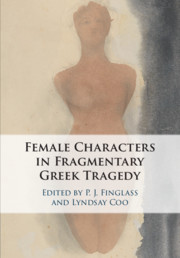Refine search
Actions for selected content:
7 results
3 - Reception and Legacy of Farrenc’s Nonet
-
- Book:
- Louise Farrenc: Nonet for Winds and Strings
- Published online:
- 23 October 2025
- Print publication:
- 23 October 2025, pp 118-142
-
- Chapter
- Export citation
Chapter 2 - Frederick Douglass
- from Part I - Careers
-
-
- Book:
- American Literature in Transition, 1851–1877
- Published online:
- 15 June 2022
- Print publication:
- 23 June 2022, pp 27-41
-
- Chapter
- Export citation
1 - Introduction
-
-
- Book:
- Female Characters in Fragmentary Greek Tragedy
- Published online:
- 11 June 2020
- Print publication:
- 02 July 2020, pp 1-16
-
- Chapter
- Export citation
3 - Greek Tragedy and the Theatre of Sisterhood
- from Part I - Themes
-
-
- Book:
- Female Characters in Fragmentary Greek Tragedy
- Published online:
- 11 June 2020
- Print publication:
- 02 July 2020, pp 40-61
-
- Chapter
- Export citation

Female Characters in Fragmentary Greek Tragedy
-
- Published online:
- 11 June 2020
- Print publication:
- 02 July 2020
21 - The Bible in North America
- from Part III - Reception of the Bible Geographically
-
-
- Book:
- The New Cambridge History of the Bible
- Published online:
- 09 June 2015
- Print publication:
- 13 April 2015, pp 391-426
-
- Chapter
- Export citation
14 - Liberationist readings of the Bible
- from Part II - New Modes of Study of the Bible
-
-
- Book:
- The New Cambridge History of the Bible
- Published online:
- 09 June 2015
- Print publication:
- 13 April 2015, pp 249-260
-
- Chapter
- Export citation
